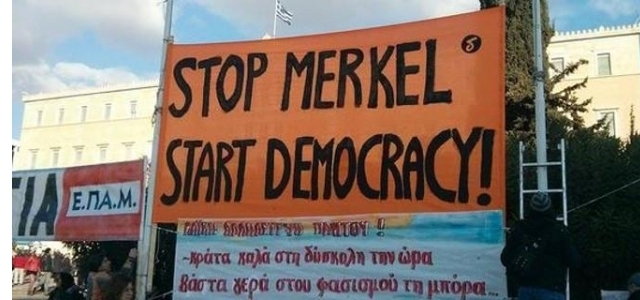Is there life for capitalists after the present, ill-fated EU? Of course there is, if they choose to abide by harmonious humanity and not rampant individualism. PROUT points to a true European and global socio-economic renaissance of welfare and progress for all.
Photo: From an anti-EU rally in Athens, Greece.
By Trond Øverland
The European Union (EU) matters because Europe is where democracy took root. Europe is also the place where a great deal of modern political thought emerged. It is the continent of the Enlightenment, industrial revolution, and the economic system of capitalism.
Consequently, to most people today the EU is a powerful politico-economic structure stemming from the cream of the time-honoured European political think-tank hailing back to ancient Greece. Certainly the EU has great symbolic value to the entire world. Should its structure break down, its collapse will echo everywhere.
Normally, people of a society feel strongly for their community, as it provides them with a sense of unity, common momentum, mutual support and agreement, cooperation, combined reserves against uncertainty, etc. This is also true for a system that is about to break. There, two belligerent sentiments emerge in conflict – one group holds on to status quo while another embraces a fresh vision of community based on values different from those of the current establishment.
Deep down the EU is based on crucial factors of capitalist industrialism. The four pillars on which the mighty EU structure rests are free flow of: capital, work force, goods, and services. This capitalist fundament has given both European and global capitalists a free hand in Europe and has turned the EU into a perfect vehicle for capitalism in politically sensitive Europe.
Here an important question arises: What sort of community does capitalism generate?
Essentially, capitalism is not about society, it is about individuals. Capitalism allows one individual to become rich at the expense of others, even to the extent of making millions paupers and debt slaves. It is therefore natural that the new vision growing out of resentment against scarcity and destitution is a rebirth of society, a renaissance of human culture.
At the economic level, such visionary collective sentiments may initially express themselves as protectionist attitudes and self-centred policies; in the form of localised approaches focusing largely on local people’s needs and resources. This is where the existing EU should have started, with a vision of the welfare of the entire locality.
Buildings have to be built from the bottom; it is not possible to build anything concrete from the top. But the masters of global capitalism, with their exclusive focus on spin-off economics in the global casino and total lack of interest in the real economy, certainly think otherwise. Therefore the present EU structure is about to crumble. In its stead the Europeans have to develop a new organization, this time from the bottom-up, and not from the imaginary sky of giddy capitalists.
Is there then life after the EU for capitalists? Can they exist and even thrive in a genuine bottom-up society? Of course they can, if they choose to abide by harmonious humanity and not rampant individualism. The capitalist tendency is a natural human trait, and like all other human traits it should exist in agreement with other human traits and not take precedence over all and sundry. Industrial dynamism and competent management of capital is a priceless, benevolent social resource. It should not however be given free rein so as to profit individuals exclusively but should exist for society as a whole and for all its individuals.
PROUT is the only theory today that points to a true European and global socio-economic renaissance of welfare and progress for all. Among PROUT’s principles that addresses this vision most conspicuously, we find the first fundamental principle of PROUT and the principle of socio-economic unity in diversity – the idea of numerous samajas functioning well together in ever-increasing economic, cultural and political synthesis.

